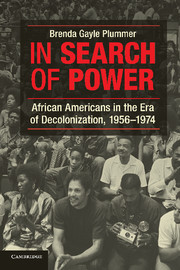Book contents
- Frontmatter
- Contents
- Figures
- Introduction
- 1 A Great Restlessness
- 2 Peace or a Sword?
- 3 “Freedom’s Struggle Crosses Oceans and Mountains”
- 4 Meeting Odinga
- 5 When Race Doesn’t Matter
- 6 Embracing the Globe
- 7 Race, Space, and Displacement
- 8 Africa and Liberation
- 9 Agenda Setting on Two Continents
- Conclusion
- Bibliography
- Index
- References
7 - Race, Space, and Displacement
Published online by Cambridge University Press: 05 December 2012
- Frontmatter
- Contents
- Figures
- Introduction
- 1 A Great Restlessness
- 2 Peace or a Sword?
- 3 “Freedom’s Struggle Crosses Oceans and Mountains”
- 4 Meeting Odinga
- 5 When Race Doesn’t Matter
- 6 Embracing the Globe
- 7 Race, Space, and Displacement
- 8 Africa and Liberation
- 9 Agenda Setting on Two Continents
- Conclusion
- Bibliography
- Index
- References
Summary
Proponents of more educational opportunity for minority youth saw schooling as the avenue to social peace. But the liberal response to youth unrest was not the only one. The FBI’s approach was governed by its police orientation and a broadly punitive attitude that continues to suffuse U.S. society. The Bureau helped to create and disseminate a popular view of outlaw culture in which young thugs engaged in violence for individual rather than collective ends. There was little room to consider political motivations and collective action outside the framework of criminal conspiracy. Revolutionists in this formulation were far from stolid Stalinist bureaucrats. Instead they acted, like other malefactors, more from narcissistic impulses than from moral conviction.
The thin line that had always separated revolutionaries from outlaws aided the FBI’s work. A tension existed between the potential for politicizing delinquents and their centrifugal tendencies toward solipsism and vice. Radicals like Max Stanford believed that youth gangs had revolutionary promise and published this opinion in the Liberator in January 1965. The article hit the press around the same time that Malcolm X’s autobiography appeared. The Autobiography of Malcolm X and Stanford’s essay both focused on the salvation of the so-called lumpenproletariat, the term Karl Marx had applied to jobless workers at the lowest economic levels, criminals, and the rootless. Malcolm X claimed that the Nation of Islam had redeemed him from lumpen status. The Black Panther Party, formed in Oakland, California, began to proselytize street organizations. Black Panther Alprentice “Bunchy” Carter, a member of the five-thousand-strong Los Angeles Slausons, brought a branch of it into the party in 1967. Like Malcolm earlier, Carter converted to Islam while jailed and met Eldridge Cleaver when both were at Soledad Prison.
- Type
- Chapter
- Information
- In Search of PowerAfrican Americans in the Era of Decolonization, 1956–1974, pp. 235 - 270Publisher: Cambridge University PressPrint publication year: 2012

